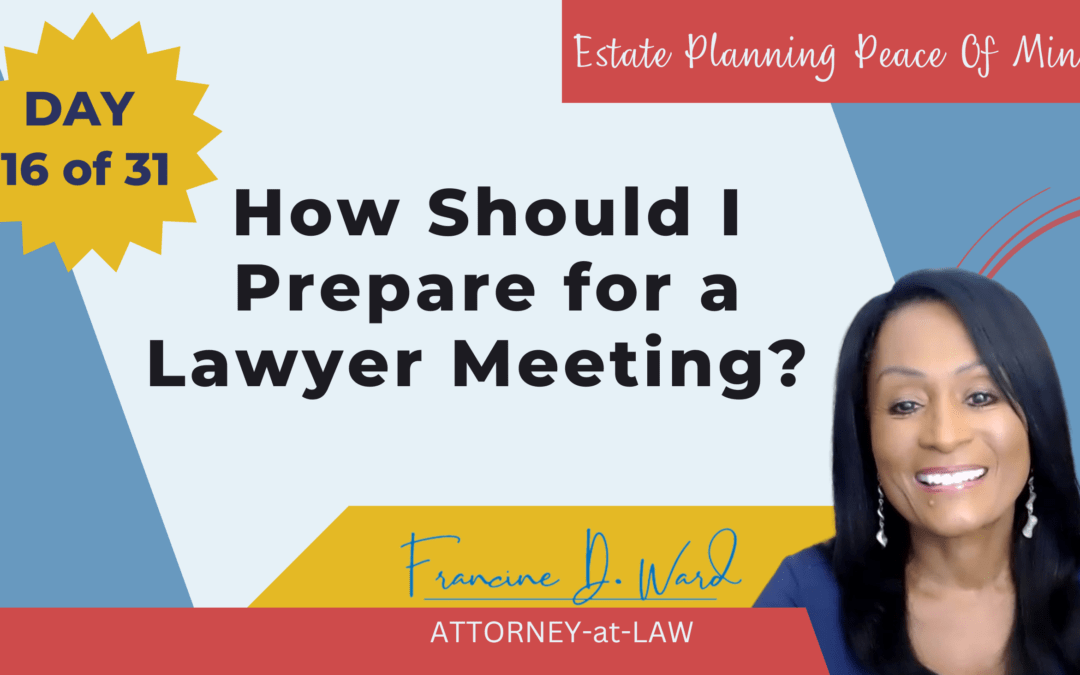A common question often asked by people who want to hire an estate planning lawyer is, “How do I prepare for the first meeting?” Is the meeting in person? Is it virtual? Is it by phone? If it’s by phone, does the lawyer call me, or should I call them? What should I bring to the meeting—everything, some things, nothing, just myself? May I bring a friend or a family member if it’s my estate plan? If married, do both spouses need to be at the meeting? If we have kids, do they need to come? Do I even need to attend the meeting, or may I send a proxy? These are just a few questions one might ask in preparation for the first meeting.
Where Does the First Meeting Take Place? Subsequent Meetings?
There was a time when this would not have been an issue, nor a question asked. All meetings were assumed to occur in person and at the lawyer’s office. But while holding meetings on a virtual platform is not new, the coronavirus pandemic took things to a new level. When Covid hit, and we were sheltered in place, everyone went virtual. Now, three years later, many people, including lawyers, have discovered the benefit of continuing to hold meetings virtually.
So, where does the first meeting with your lawyer take place? It depends. How do you find out? Ask your lawyer where the meeting will take place. These days many estate planning lawyers still prefer to meet on Zoom. Others are happy to meet in person. Still, others hold their meetings virtually except when it’s time for the execution of the documents. The best way to know what your lawyer expects is to ask them.
What Should You Bring to the Meeting?
Not all lawyers are created equal. Therefore, not all lawyers operate their practice in the same way. Therefore, asking the lawyer what they want to see during the first meeting is always best. If the first meeting is an initial consult to determine if you and the lawyer are a good fit, perhaps there is no need to bring anything. Some lawyers might want to see any existing documents. The best way to find out is to ask.
Who Should Attend the Meeting?
It depends. If you are a married couple and want jointly created documents, then both of you will likely want to attend the meeting. Be aware that you will probably need to sign a waiver of privilege. This means you and your spouse will have no attorney/client privilege. So if you have a secret stash, hidden assets, or a Pied-à-Terre, you may want to hire separate lawyers.
If you are single and want to bring a friend or family member to the meeting, the attorney/client privilege may still be lost. Because each state has laws, you should discuss this with your attorney before inviting anyone to the meeting.
Rule of thumb, only persons who need to attend the meetings should be there. Ask your attorney when in doubt. That includes you. You must attend the meeting if you hire a lawyer to create your documents. No proxy allowed. Unless you are a minor, you must be present. And even if you are a minor, you and your guardian must be present.

Francine D. Ward
Attorney-At-Law, Author, Speaker
Follow Francine:
Don’t miss Francine’s Latest Blogs:
- AI and PatentsAI and Patents. Understanding Patent Law in the Age of AI. Patents, along with Copyrights, Trademarks, Trade Secrets, and Rights of Publicity, are one of the five areas of practice… Read more: AI and Patents
- Effective Goal SettingSetting Goals. It’s that time of year, time to plan for effective goal setting. A time when some of us start thinking about goals for the upcoming year. If you… Read more: Effective Goal Setting
- Indemnify AI UseBeware of companies that say they will indemnify AI use, that they will pay ALL the legal costs incurred by customers using Generative AI services (like ChatGPT, CoPilot, or Bard).… Read more: Indemnify AI Use
- Trademark A NameHow to Trademark a Name A trademark can be a word, phrase, design, logo, color, sound, or a combination of those things that identifies the source of a product or… Read more: Trademark A Name
- AI and copyrightThe Ongoing AI Authorship Debate. Artificial Intelligence (“AI”), while not new, has become the new darling of the technology world. AI-generated works of art have ignited a firestorm among legal… Read more: AI and copyright












